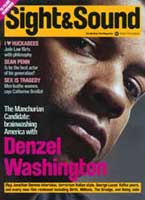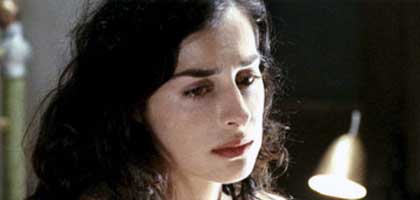
Written On The Body

An interview with Catherine Breillat
Geoffrey Macnab: What were your goals in making Anatomy of Hell?
Catherine Breillat: I wanted to confront this forbidden image, to present a close-up of the female sexual organ - that which can't be seen, which can't be watched - so as to ask if this is what sexuality is really all about. I created the terrifying emotional substrata exploring the nature of sex to allow me to transcend the usual, horrible images that form the basis of the porno films people take pleasure in watching.
How closely does the film relate to your novel 'Pornocratie'?
I wrote the novel knowing I was going to make a film of it, but I didn't treat it as a blueprint. In the novel the woman pays the man so she can discover what sexuality is really about but in the film she already knows and places herself in an almost Christ-like position of revealing it to the man. It was in the editing that I realised that as a film-maker I had taken up the man's point of view.
With its use of poetic voiceover and mythical references, this is a very literary film.
In our society pornography is written on every woman's body. But here the words give you a context in which to confront the images that arouse so much fear, allowing you to create a transcendent beauty out of things you've been told are purely ugly. I'm dealing with images that are both essential and frightening, so it was important to provide a literary and mythical context.
It's striking that Rocco Siffredi's character is at his most violent and misogynistic when he feels most threatened.
In the scene in the bar he describes sex in the ugly way it is presented in pornography - he says he fucked her, and then he turned her over and fucked her up the ass - with no emotion or love attached to the act of love-making. It's the way all men talk about sex, and also all the censors and religious creeds that teach us it's an abominable act. But when he realises that the vulgar terms he's using are a lie, he begins to cry. He doesn't even know her name, yet his sense of loss is overpowering. This is what making love is about, and the depth of his emotion is a revelation to him.
Why do you place so much emphasis on religious references?
Religion would have us believe that sex is simply about the flesh when in fact it's something higher and more idealistic. Religion says our bodies can't be seen because they are ugly and dirty when in fact the taboo is more about rituals of initiation: in ancient Hebrew the word for 'naked' is the same as the word for 'secret'. I see the film as taking place in a post-religious context, though I draw on Renaissance painting, which presents images of religious ecstasy that are also images of sexual ecstasy.
Are you from a religious background?
As soon as I'd done catechism classes I realised religion wasn't about uplifting people, it was about lowering them down. I was very isolated as a child - I started to menstruate and develop physically very early and my parents saw me as a walking time bomb and tried to protect me from myself and from the lust I might arouse in others. The town we lived in had a huge library and once I'd read the children's books I started on the adult section. I found names like the Marquis de Sade and the Count de Lautréamont, who wrote Maldoror, very appealing so I had access to works that would not usually have been given to a young woman.
You read the male character's voiceover yourself in the film. Why?
When I saw the film with the voiceovers read by the two actors I realised it came across as more Freudian than mythical. For me it was always more about consciousness and destiny than psychoanalysis, so we kept my voice as the voice of destiny.
The intertitle that opens the film tells us a body double was used for the actress in the most intimate scenes. "It's not her body, it's an extension of a fictional character."
For Romance I found an actress who was prepared to accept a sexually explicit role. It shows how conservative times have become that five years later it was impossible to find an actress for Anatomy of Hell. The body double wasn't a solution I was happy with, but at the same time I wasn't going to let the lack of an actress stop me from making my film. If you imagine me as a painter, then it's as if Amira gave me the red in my palette, but for other scenes I needed blue and I chose another body to supply it.
Amira wanted to be able to say that she didn't sleep with Rocco, that it wasn't a sexual act. Her position is puritanical, but I don't condemn her because it's my film at the end of the day and she just acts in it and interprets it. Given the society we live in, it's very courageous of her to have done what she did. After all, my film is about showing what is unwatchable.
Why are you opposed to Freudian readings of your work?
To me Freud is the protector of bourgeois society: he assuages the symptoms so that society can continue unchanged. His analysis of women was very naive: women at that time had so little power it was natural they would feel a desire to be a man. That wasn't penis envy - it was envy for the rights men had.
